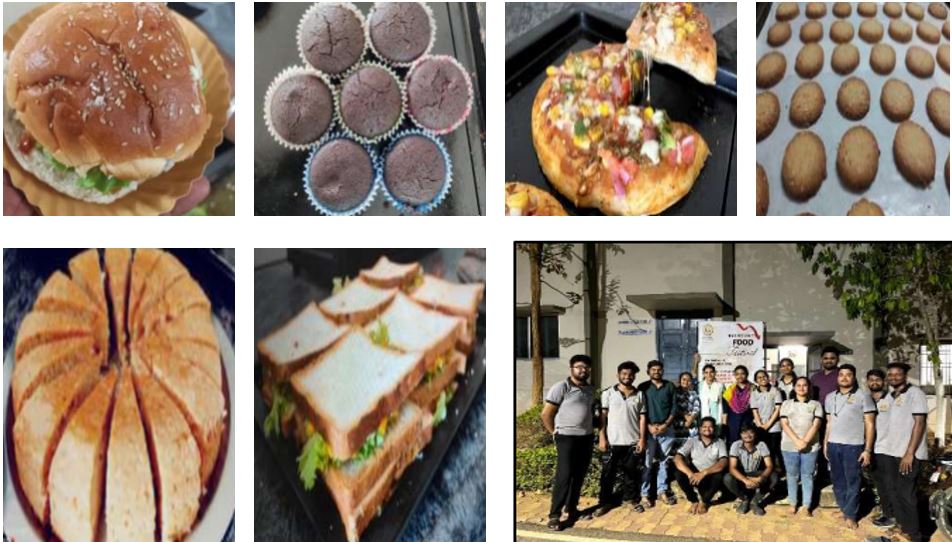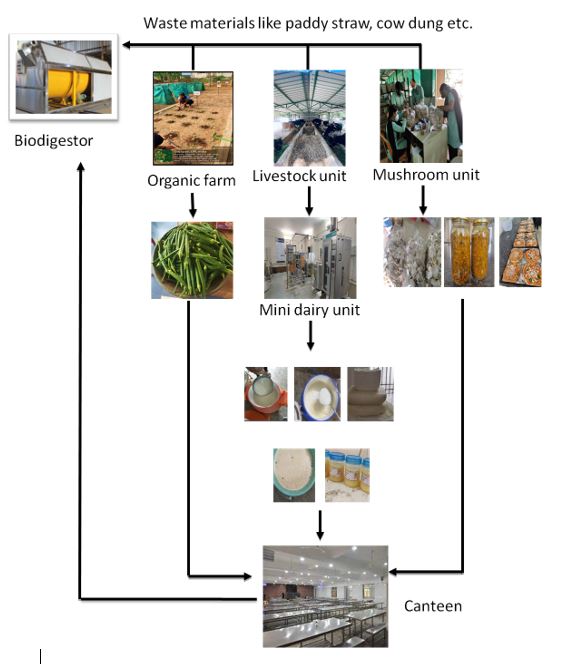Students and Staff Hunger Interventions at Centurion University
Food security is a complex issue that exists when everyone has social, physical, and financial access to sufficient, safe, and nutritious food that meets their dietary needs and food preferences for a healthy and productive life. Global malnutrition trends, particularly undernutrition, are alarming. According to the Food Insecurity Experience Scale (FIES), 9.2% of the global population, or around 700 million people, suffer from severe food insecurity, while 26.4% (or 2 billion people) experience moderate to severe food insecurity, lacking consistent access to sufficient food. This has led to widespread micronutrient deficiencies, especially in Asia, Latin America, and Africa, resulting in undernutrition manifesting as stunting, wasting in children, anaemia in women, and other chronic ailments.
In response to these concerns, Centurion University ensures that the food provided to its students and staff is not only nutritious but also aligned with global food security initiatives. The university prioritises food security, recognising its role in the fight against malnutrition and in promoting sustainable, nutritious diets for all.
Project Interventions at Centurion University
Livestock Unit
Centurion University has established a Livestock Unit (LU) to support food security on campus. The unit serves as a resource for producing milk, meat, and eggs, contributing directly to campus food outlets and addressing hunger needs. The livestock unit includes:
- 62 cattle and buffaloes
- 25 pigs
- 49 sheep and goats
- 670 White Leghorn birds, along with other poultry such as Rhode Island Red, Kadaknath, and turkeys.

The defecated waste from these animals is used as organic manure for growing crops, while hybrid Napier grass is cultivated to supply fodder to livestock. This closed-loop system reduces waste and promotes sustainability in food production.
Dairy Unit
The Dairy Unit at Centurion University is a vital part of the institution’s hunger interventions. It produces:
220 liters of milk per day, consisting of 165 liters of cow milk and 55 liters of buffalo milk.
Monthly production includes 3,460 liters of curd, 40 kilos of ghee, and 110 kilos of paneer.

This dairy production ensures a steady supply of nutrient-rich food products for students and staff, offering essential micronutrients such as calcium, phosphorus, and magnesium, along with proteins and vitamins like A and D. The fresh dairy products are provided at campus food outlets, directly contributing to the nutritional needs of the university community.
Mushroom Unit:
Mushroom is a rich source of nutrients with digestible essential amino acids, protein, vitamins, and minerals but with a low volume of high-quality unsaturated fat and water-soluble carbohydrates. Also known to have medicinal benefits– found in health tonics, teas, soups, and herbal formulae. Environmental benefits include an essential ecological role in the management of ecosystems. Mushroom cultivation is a bioconversion of organic substances, and inputs used in mushroom cultivation can be applied as organic manures to the land after harvesting.
The mushroom unit at Centurion is spread out in an area of 3,600 sq mt with a capacity of 600 beds. The paddy straw mushroom cultivated yields approximately 100kg of mushroom/bed. Button mushroom cultivation has started in the unit and it is showing very good yield of approximately 600 kg in one cycle.
Baking Unit:
Baked foods cut down the intake of fats and calories and help maintain a healthy weight and diet. Equipment like rotary convection ovens, bread slicers, spiral mixtures, weighing machines, and packing machines are used in baking units to prepare different bakery products. Students also get an excellent opportunity to prepare bakery products which are trending these days for functions and parties. In addition, they get more chances to bake some healthy nutritive products. The baking unit in the University has been dishing out a line of products, especially with millets (ragi cupcakes, ragi bread, ragi biscuits, ragi muffins) as well as from wheat such as wheat bread and wheat pizza, keeping in view the health benefits of ragi.

Ragi (finger millet) is a rich source of calcium (100 g of flour contains 344 mg of calcium) and iron, gluten-free, and contains the essential amino acid methionine. The baked products exclude refined sugar and are substituted with jaggery (a rich source of iron) and served as a snack to meet the nutritional requirements of the students. The unit went into operation in 2018 and has continued its operations since then.
Hunger Interventions for Students and Staff
At Centurion University, hunger interventions aim to directly target food insecurity among students and staff. These initiatives ensure that everyone has access to nutritious food, particularly those who might be facing financial challenges.
Key Interventions Include:
- Food Banks and Pantries: The University has established food banks and pantries across campuses to ensure that students and staff who face food insecurity can access free or low-cost groceries, including staples like grains, dairy products, and fresh vegetables.
- Subsidised Meal Programs: Centurion University offers subsidised or free meal programs for students from low-income backgrounds. The meals provided are balanced and designed to meet the caloric and nutritional needs as per ICMR guidelines.
- Food Waste Management and Redistribution: The university ensures that food waste is minimised through careful meal planning and portion control. Surplus food is either distributed to local communities or utilised for livestock feed, reducing food waste and supporting food security beyond campus boundaries.
- Nutritional Education: Centurion University conducts regular workshops on nutritional health and food security to educate students and staff about healthy eating habits, budgeting, and food management.
- Emergency Food Assistance: In cases of acute need, emergency food relief programs are available, ensuring that no student or staff member goes without access to necessary food resources.

Centurion University’s comprehensive hunger interventions aim to end hunger by improving access to nutritious food. Through sustainable food production systems, livestock and dairy initiatives, and support for vulnerable students and staff, the university is actively contributing to the fight against food insecurity. These efforts ensure that the Centurion community can thrive, both academically and in terms of health and well-being, with access to nutritious and sufficient food at all times.
